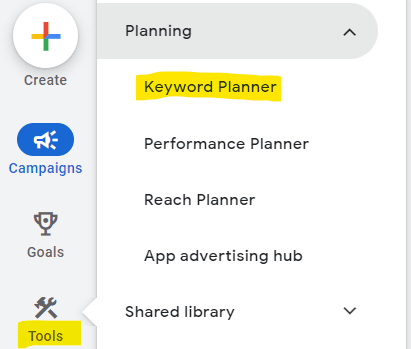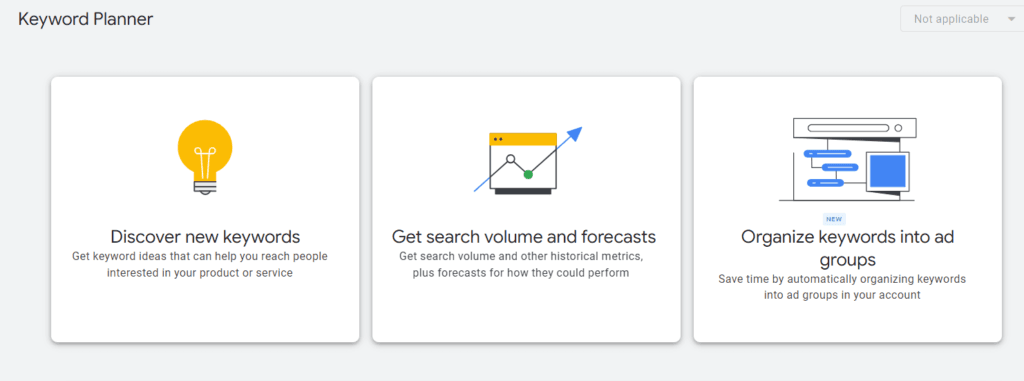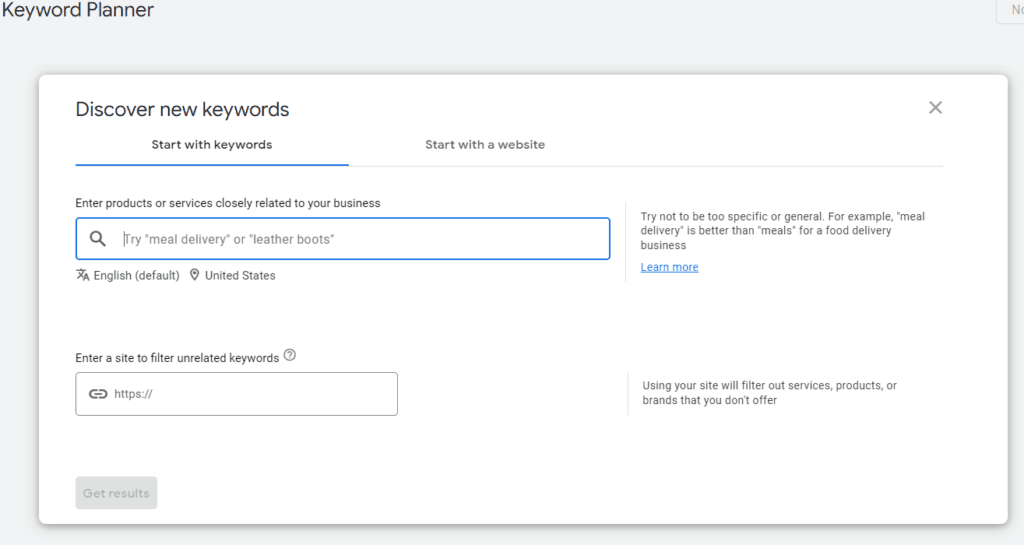Keyword research is the foundation of successful Google Ads campaigns. Google Ads was built on the idea of matching user search queries with highly relevant ads and landing pages. In this article, we’ll explore the essential steps of conducting keyword research for your Google Ads search campaigns.
Why is keyword research so important for google ads?
1. Enhancing Ad Relevance
When it comes to Google Ads, one of your primary goals is to make sure that your advertisements are displayed to the right audience. Keyword research plays a pivotal role in achieving this level of relevance.
2. Simplifying Your Bidding Strategy
Setting the right bids for your Google Ads campaign can be a bit of a puzzle. However, keyword research simplifies this process by providing insights into the average cost per click (CPC) for different keywords. This knowledge allows you to make informed decisions on how to allocate your budget effectively while aiming for optimal performance.
3. Uncovering New Opportunities
Keyword research is like a treasure hunt for advertisers. It helps you unearth new, relevant keyword variations and long-tail phrases that you might not have initially considered. By expanding your keyword list, you can tap into previously undiscovered opportunities to reach potential customers.
4. Gaining Insights into Search Volume
Understanding the search volume for specific keywords is essential for your Google Ads strategy. Keyword research provides insights into which keywords are in high demand, allowing you to prioritize your bidding efforts. Targeting high-traffic keywords can result in increased ad impressions and potentially more clicks.
5. Elevating Ad Relevance for Better Performance
Ultimately, the success of your Google Ads campaign hinges on ad relevance. When your keywords align closely with user intent, your ads are more likely to perform well. This optimization not only improves your quality score and ad rank but also leads to discounted clicks. Carefully selected keywords can result in higher clickthrough rates, conversion rates, and a better return on investment (ROI).
Understanding Keyword Match Types
Before diving into keyword research, it’s crucial to understand the three primary keyword match types in Google Ads: broad match, phrase match, and exact match.
- Broad Match: This match type allows your ads to appear on searches related to your keywords, even if they are loosely related.
- Phrase Match: Your ads will only show when a search query includes the exact phrase or a close variation of your keyword.
- Exact Match: Your ads will only appear when a search query matches your keyword precisely.
Keep in mind that Google has made significant changes to match types recently, so understanding these nuances is crucial for effective keyword research.
The Keyword Research Process
Now, let’s dive into the step-by-step process of conducting keyword research for your Google Ads search campaigns:
Step 1: Access the Keyword Planner
- Log in to your Google Ads account.
- Navigate to “Tools and Settings” and select “Keyword Planner.”
- Choose the “Discover New Keywords” option.

Step 2: Input Relevant Keywords
In the Keyword Planner, enter a list of relevant keywords related to your business or product. You can also add your website URL to get more keyword ideas.

Step 3: Filter and Select Keywords
Review the keyword recommendations provided by Google. Select keywords that are highly relevant to your campaign and have a reasonable search volume. Avoid irrelevant or overly competitive keywords.

Step 4: Create Ad Groups
Create separate ad groups for different keyword themes. Ad groups are collections of similar keywords that help you write targeted ad copy and direct users to relevant landing pages.
Step 5: Assign URLs
Assign specific landing pages (URLs) to each ad group. This ensures that users are directed to highly relevant pages when they click on your ads.
Identifying Landing Pages and Optimizing Page Titles for Your Google Ads Campaign
To ensure the effectiveness of your Google Ads campaign, it’s essential to identify the landing pages you’ll be directing traffic to. Each landing page can serve as a foundation for a new Ad Group, allowing you to maintain a clear and organized campaign structure.
Moreover, these landing pages should be aligned with specific focus keywords to enhance ad relevance and improve clickthrough rates. Additionally, you can leverage the content and topics of your landing pages to identify the most relevant keywords for each page.
Furthermore, optimizing your page titles is crucial in this process. Page titles not only play a role in user engagement but also guide you in choosing the most appropriate keywords. By aligning your page titles with your chosen keywords, you can ensure that your ad campaign targets the most relevant and high-performing keywords for each landing page. This strategic approach enhances the overall quality and performance of your Google Ads campaign.
Why choose landing pages and not the home page?
The number one mistake that leads to low conversions in online advertising campaigns is failing to match ad messaging and landing page content with user intent. Here’s why this is such a critical error:
1. Mismatched Expectations: When users click on an ad, they have certain expectations based on the ad’s messaging. If the landing page doesn’t fulfill those expectations, it creates a disconnect. Users are less likely to engage with or convert on a page that doesn’t immediately address their needs or interests.
2. High Bounce Rates: A mismatch between ad and landing page content often results in high bounce rates. Visitors quickly leave the landing page because they didn’t find what they were looking for, which negatively impacts your conversion rate.
3. Poor User Experience: Users expect a seamless and relevant experience from the moment they click an ad to when they interact with a landing page. A lack of alignment disrupts this experience, making it more likely that users will abandon the page and potentially form a negative impression of your brand.
4. Wasted Ad Spend: Low conversions not only mean a lower return on investment (ROI) but also wasted ad spend. You’re paying for clicks that don’t lead to conversions, which can quickly erode your advertising budget without delivering results.
5. Ad Quality Score: In platforms like Google Ads, ad quality score plays a significant role in ad positioning and cost per click. A poor-quality landing page that doesn’t match ad relevance can lead to lower quality scores, making it more expensive to bid on keywords and secure prominent ad placements.
6. Missed Opportunities: When you don’t align your landing page content with user intent, you miss out on opportunities to engage and convert potential customers. A well-optimized landing page has the potential to turn a click into a lead or sale.
7. Competitive Disadvantage: In highly competitive industries, businesses that successfully align their ad messaging and landing page content gain a competitive advantage. They can capture and retain users’ attention, leading to higher conversion rates and better overall campaign performance.
Step 6: Download Keyword Data
Download the keyword data, including average monthly searches, competition levels, and bid ranges, into a CSV or Google Sheets file for reference.
Step 7: Organize Keywords
Organize your keywords into different ad groups within your campaigns. Ensure that each ad group contains related keywords and points to the appropriate landing page.
Step 8: Optimize Your Campaign
Once your keyword research and campaign structure are in place, regularly optimize your Google Ads campaign using an optimization checklist to ensure ongoing success.
Bonus Keyword Tips – Unconventional Keyword Research Tips: Finding Hidden Gems
Keyword research is the cornerstone of any successful SEO or online advertising campaign. While you’re probably familiar with the basics, there are lesser-known techniques that can give you a competitive edge. In this article, we’ll explore eight unconventional keyword research tips that often go under the radar but can yield impressive results.
1. Competitor Keyword Gaps
One of the secrets to staying ahead of the competition is to analyze their keyword strategies. Tools like SEMrush and Ahrefs allow you to identify keywords your competitors are ranking for but you aren’t. By bridging these gaps, you can expand your keyword list and potentially steal some of their organic traffic.
2. Reddit and Quora Insights
Online communities like Reddit and Quora are treasure troves of real user questions and discussions. Dive into relevant subreddits and Quora topics related to your industry. Take note of the exact phrases and questions people are asking. These user-generated insights can be invaluable for tailoring your content and keyword strategy to real user needs.
3. Unlocking YouTube Keywords
YouTube is the world’s second-largest search engine, and optimizing your video content for search is essential. Use YouTube’s autocomplete feature to discover keyword suggestions as you type in your main keyword. These suggestions can unveil popular search terms on YouTube that you can target to boost your video content’s visibility.
4. Tap into Wikipedia
Wikipedia articles are often densely packed with keywords and phrases related to specific topics. Search for your target keyword on Wikipedia and explore the article’s table of contents and sections. You’ll likely find a plethora of related keywords to include in your strategy.
5. Consider Seasonal Keywords
Not all keywords are created equal throughout the year. Some experience significant fluctuations in search volume due to seasonality. Google Trends can be your ally here. It offers insights into how specific keywords perform over time. Use this data to adjust your content and advertising strategies to match the seasons.
6. “Searches Related To” on Google
Hidden beneath the search results on Google lies a treasure trove of related keywords. At the bottom of the search results page, you’ll find a “Searches related to [your query]” section. These closely related searches can provide you with valuable keyword ideas that are directly associated with your main keyword.
7. Explore Long-Form Keyword Variations
While short-tail keywords are essential, don’t underestimate the power of long-tail variations. These longer, more specific phrases often have lower competition and higher conversion rates. Tools like AnswerThePublic can help you find long-tail keywords based on common questions in your niche.
8. Localized Keywords with Google Maps
For businesses targeting local markets, Google Maps is a goldmine for keyword research. Search for your business category or industry in Google Maps and scrutinize the names, descriptions, and reviews of competing businesses. This can reveal location-specific keywords to target, helping you dominate your local search results.
Conclusion
In the fast-paced world of digital marketing, keeping up can seem like a daunting task. But guess what? You’ve got the power to do your own keyword research, and it’s not as complex as it may seem! While the classic keyword strategies are essential, there are some cool, lesser-known tricks that can truly give your campaigns a boost.
Think about it like this: You can use these strategies to dive into your competitors’ world, tap into the wisdom of online communities, and even get inside the minds of YouTube users. It’s like having a secret decoder ring for the digital realm!
But here’s the thing: These unconventional methods aren’t just for the marketing pros. Nope, they’re for anyone with a bit of curiosity and a desire to stand out online. You’ve got the tools, you’ve got the creativity, and now you’ve got these tips in your back pocket.
So, why not give it a shot? Embrace these unique keyword research tactics, make them your own, and watch your online presence soar. Remember, keyword research isn’t some mysterious art—it’s about understanding your audience and giving them what they’re looking for.
With these tricks up your sleeve, you’ve got the confidence to conquer the digital jungle and achieve remarkable results. So, go ahead, dive in, and let your keywords lead you to success. Happy researching!










